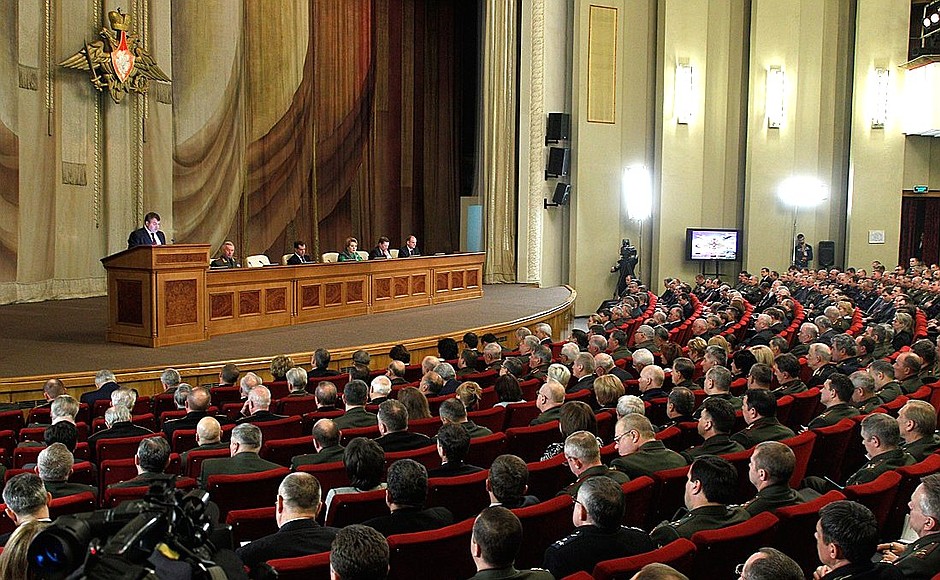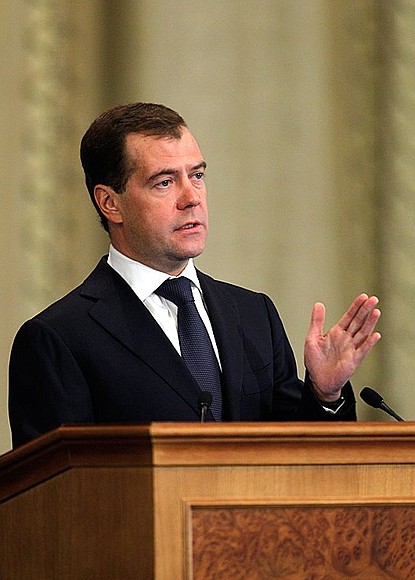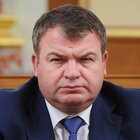The meeting was attended by heads of central bodies of the military command, commanders-in-chief of Armed Forces branches and commanders of combat arms, heads of military districts, task forces and units, and heads of all federal services and agencies subordinated to the Defence Ministry.
Issues discussed at the meeting included the process of Armed Forces modernisation and the servicemen’s social benefits. The keynote speaker was Defence Minister Anatoly Serdyukov.
Later, Dmitry Medvedev presented state awards to a number of military personnel.
* * *
President of Russia Dmitry Medvedev: Comrade officers,
Today at the expanded meeting of the Defence Ministry Board we will discuss the results of 2011 and the achievements of the past few years in strengthening the country's defence capability and building a new image of our country and the Armed Forces. I will also outline the most important long-term objectives in the field of military development.
I would like to point out straight away that the Armed Forces reform is nearing completion. Most of the branches and units are ready to carry out combat missions in the shortest time possible, the composition of cross-branch units has been optimised, and thanks to the new district structure the efficiency of action planning and control has increased.
The strategic nuclear forces have been strengthened. A unified system of air and space defence forces has been established, combining air and missile defence forces, a missile warning system and space control.
”As a result of the reform, we have new Armed Forces, more up to date and able to respond to potential threats.“
In 2008–2011, troops were supplied with mostly modern armaments and military equipment. Their share increased from 10% to 16%. During the same period the intensity of combat and operational training rose by 200%. Large-scale exercises have not only been a serious test of army and navy combat capability, but also helped develop new approaches to warfare under modern conditions.
As Commander-in-Chief, I participated in all the key exercises and would like to emphasise that the Armed Forces personnel and leadership have demonstrated their ability to solve tactical and strategic objectives.
Overall, as a result of the reform, we have new Armed Forces, more up to date and able to respond to potential threats.
However, the pace and nature of geopolitical changes require that we take a new look at ensuring Russia’s state and military security, the balance of priorities in international relations and international military cooperation. I have spoken about it more than once and am ready to reiterate: the security of our citizens, our country and our allies requires guaranteed defence.
Our military power and ability to respond to threats must be such that no one else in the world is tempted to test them. Therefore, the development of military organisation will remain a state policy priority, and substantial funds will be channelled for national defence until 2020: at least 2.8% of GDP.
In this context, I would like to note several fundamental tasks.
First. We must develop a unified system of military planning and legislative framework in the defence field, adopt relevant amendments to the laws on defence, on military emergency and in a number of other areas in order to concentrate the resources allocated for defence and optimise their spending.
Second. Particular attention should be paid to the implementation of the State Armaments Programme for 2011–2020 and ensuring the supply of modern weapons systems to the army and navy. Bear in mind that by 2015 the proportion of such weapons should be increased to 30%, and by 2020 to 70% or even 100%, depending on the particular branches and types of troops.
”The security of our citizens, our country and our allies requires guaranteed defence. Our military power and ability to respond to threats must be such that no one else in the world is tempted to test them.“
Substantial funds have been allocated for the implementation of the programme: over 23 trillion rubles [$800 billion]. We must not allow the recurrence of the situation which arose with the placement of defence contracts last year. There must be no inconsistencies with the conclusion of contracts, their payment and fulfilment of contractual obligations. Those responsible for non-fulfilment of such tasks or for delaying the completion of contracts will be held accountable.
Third. It is imperative to complete the creation of a new Armed Forces control system, especially at the brigade and tactical level. It should be integrated into a single information space, based on modern information and telecommunication technologies.
The fourth priority is to improve military education, to strengthen the material and technical base and human resources at military training and research centres and their branches. New presidential cadet schools must be launched. This year, new schools should be opened in Tyumen and Krasnodar, to be followed by Tomsk, Moscow, St Petersburg and Vladivostok.
The social status of retired military personnel remains our absolute priority. I firmly believe that the defenders of the motherland and their family members must enjoy a decent package of social guarantees.
From January 1, 2012 a law on wages for the military personnel and providing them with various financial incentives came into force. The declared target for the pay of the first officer's position and the first military rank was to increase them by 200%. This target has been reached. The average military pension has been raised by no less than 1.6 times.
The housing issue has been tackled actively. In the 2009–2011 period, homes were provided to 132,000 families, and nearly 300 billion rubles [$10 billion] were spent on this initiative. Such a volume of the housing stock will reduce the number of servicemen in need of permanent housing to 60,000. Considering the personnel registered this year, there are plans to build and purchase housing for 65,000 families over the next two years. There will be a significant increase in the service housing stock.
Once again I would like to emphasise that the state will continue to enhance the social status of military personnel. Their mission is to ensure Russia’s defence capability, and caring for them and creating decent conditions for their service remain important factors in the development of the Armed Forces.
In conclusion I would like to highlight that in the recent period, over the past several years, much has been done to build a new image for the army and navy, to develop military organisation and increase the prestige of military service. It is absolutely essential to continue these efforts as much still remains to be achieved. One of the prerequisites for the reforms’ success is active participation of commanders at all levels in the modernisation of the Armed Forces.
<…>
Dmitry Medvedev: Comrades,
In my opinion, the report we have heard accurately reflects the overall situation that has emerged in the Armed Forces. I will not comment in detail on what has been achieved but will remark on five points.
”The negotiations will continue but be prepared for a serious re-equipment of the Armed Forces so that we are capable of providing a response to the European missile defence initiative.“
As far as housing is concerned, it is essential, as Mr Serdyukov said, to take all the necessary measures to expedite the registration of housing and its commissioning. I keep getting reports that many buildings have been completed but residents have not been allowed to move in. That is a cause for a justified concern for military personnel. Should a need arise for legal action or legislative amendments – I know we have had a case when the registration procedure had to be repeated – these measures should be taken.
The second issue I would like to draw your attention to is that an agreement must be reached with all local government agencies on building infrastructure facilities in the areas that contain a high concentration of military housing. It is unacceptable that residential blocks are sometimes built but there are no preschools or schools in the area. This is not the responsibility of the Defence Ministry but, nevertheless, you have to reach an agreement with the authorities that whenever a new residential development is completed, the social infrastructure is commissioned at the same time. Especially since such facilities are always beneficial for the area.
Another point I would like to highlight is regarding arms procurement and contracting. You have just told me that the campaign is in process and it must be expedited as far as possible. Those who do not understand how contracts are to be concluded, whether they represent the Defence Ministry or the suppliers, must be held responsible or dismissed. Otherwise, you will never understand who is right and who is wrong. There must be no disruptions. The funds are enormous and they must be used to buy quality weapons.
Another issue: I ask the Defence Ministry and investigative agencies to complete the investigation of recent incidents in the Armed Forces (I mean both internal investigations and related investigative activities) and report back to me.
Now, with regard to missile defence: we are not closing the door on dialogue, we are conducting talks and continuing the discussion with our partners on this issue, but in any case, we need to prepare for changes. Our objective is to be fully prepared by 2017–2018, to be fully armed and able to provide a response in the context of my statement made in November 2011, with account of the corrections to be made during the third and fourth phases of the so-called European Phased Adaptive Approach to the development of missile defence. I have issued all the necessary instructions on this matter to the Defence Ministry and the Government. Thus, the negotiations will continue but be prepared for a serious re-equipment of the Armed Forces so that we are capable of providing a response to the European missile defence initiative.
Comrades, colleagues, thank you all for your service and wish you all the best.


